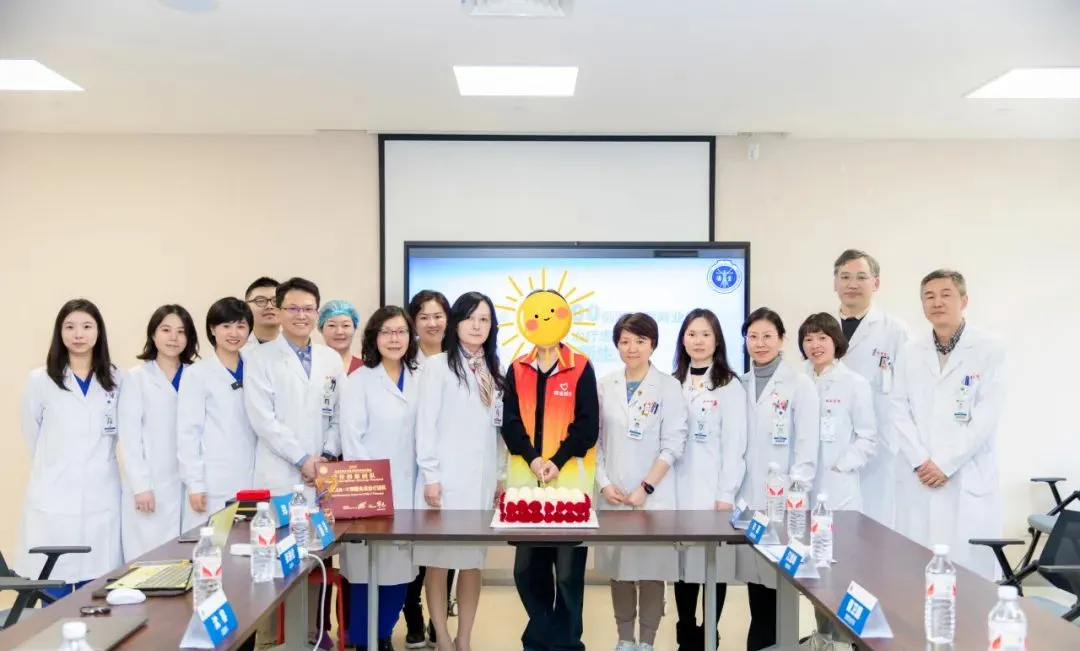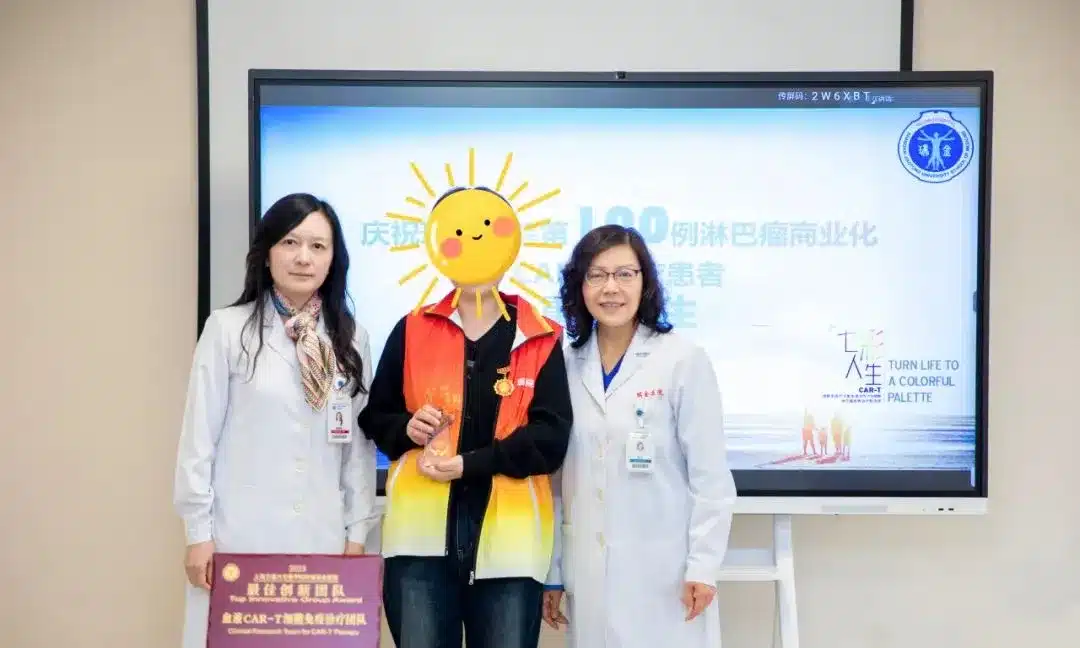CAR-T for Lymphoma: The 100th Patient Discharged from Ruijin Hospital in Shanghai
CAR-T for Lymphoma: The 100th Patient Discharged from Ruijin Hospital in Shanghai
On March 18, 2024, at Ruijin Hospital in Shanghai, China, the 100th patient with relapsed/refractory lymphoma achieved complete remission after CAR-T cell therapy and was discharged.

Lymphoma is a malignant tumor originating from the lymphatic hematopoietic system, and is a general term for a “family” of nearly 100 different subtypes.
In China, approximately 93,000 people are diagnosed with lymphoma each year, and more than 50,000 people die from the disease annually. Ms. Xu, who suffered from high-grade B-cell lymphoma, faced poor prognosis, relapse, and drug resistance, which are challenging problems for patients with this type of lymphoma.
Ms. Xu, 41 years old, had a rosy complexion, and although her face was covered with a large mask, the smile in her eyes was unmistakable. It had been a long time since she had smiled so genuinely from the bottom of her heart.
In January 2022, after a high fever, Ms. Xu’s lymph nodes began to swell. After examination in Hangzhou, she was diagnosed with follicular lymphoma, a type of blood cancer. Following six courses of heavy chemotherapy and ten courses of targeted therapy, Ms. Xu thought her treatment had ended. However, three months later, the disease relapsed and transformed into high-grade B-cell lymphoma, a more aggressive form. Local doctors recommended her to seek treatment at Ruijin Hospital.
At the hematology department of Ruijin Hospital, Ms. Xu was received by Professor Zhao Weili, a renowned expert in the diagnosis and treatment of lymphoma in China. Facing Professor Zhao, Ms. Xu broke down in tears, unable to contain the emotions she had suppressed for two years.
“You must regain your confidence and not give up!” Professor Zhao carefully analyzed Ms. Xu’s condition and treatment plan.
Ms. Xu recalled that at the time, Professor Zhao said a lot to her, but she only remembered four words: “There is hope for a cure.” This was the first time in two years that she had heard the word “cure.” Throughout her journey, no doctor had dared to say this to her. A doctor’s words conveying hope can provide immense confidence to a patient.
With the advent of CAR-T cell therapy, a new hope has been brought to patients with relapsed/refractory lymphoma. CAR-T therapy, in simple terms, involves genetically modifying T cells to install the ability to recognize and kill cancer cells within the body. If natural T cells are considered “regular troops,” then CAR-T cells are akin to “special forces.”
On November 22, 2023, after receiving the CAR-T cell infusion, Ms. Xu’s follow-up examinations at one month and three months showed that her tumor was in complete remission.
During the treatment process, Ms. Xu experienced fever. On the seventh day of the fever, she apologized to the doctors, saying, “I’m sorry, I’ve lost the battle.” The CAR-T medical team encouraged her, explaining that the “battle” with fever was temporary, and her temperature would decrease with medication.
“If the patient achieves sustained remission for more than three months, it means they have a 90% chance of being completely cured,” said Dr. Xu Pengpeng, Ms. Xu’s attending physician. However, they cannot yet say “100% cured,” and the patient will continue to be followed up to further observe the treatment effect.
The First Patient in China’s CAR-T Registered Clinical Trial Has Surpassed Five Years
Dr. Yan Zixun, the lead CAR-T physician, said, “The successful CAR-T treatment of the 100th lymphoma patient is not a period, but a comma, encouraging us to provide assistance to more patients with relapsed/refractory disease. This milestone is significant for our team.”
It is understood that since the launch of China’s first CAR-T cell therapy product, the lymphoma team at Ruijin Hospital has completed cell infusions for 116 patients. Among the evaluable patients, the complete remission rate at three months is around 80%, and the complete remission rate at 12 months is close to 70%.
“Throughout this journey, I know how difficult it has been. I want to help others and give them confidence. Attitude is truly important,” said Ms. Xu. When she was in despair, she received help from the lymphoma team and volunteers. Now that she has been cured, she wants to join the volunteer team and share her experience with more people, encouraging them not to give up.

As the 100th CAR-T patient at Ruijin Hospital, on the day of discharge, the cell therapy team and the entire team of experts from the Multidisciplinary Team (MDT) for cell immunotherapy celebrated Ms. Xu’s rebirth by cutting a cake together. Professor Zhao Weili and Director Wu Wen presented Ms. Xu with a lymphoma volunteer commemorative badge, welcoming her as a member of this family.
For this innovative therapy, the cell therapy team at Ruijin Hospital has established a comprehensive management model, including comprehensive pre-treatment patient evaluation, multidisciplinary management during treatment, and a one-to-many WeChat follow-up mode.
The MDT consultation is a crucial component of this process. Under the support and guidance of Academician Chen Saijuan, a team of lymphoma experts led by Professor Zhao Weili and Director Wu Wen, along with the CAR-T treatment team and MDT experts from critical care medicine, neurology, respiratory medicine, infectious diseases, cardiology, gastrointestinal surgery, radiation oncology, radiology, nuclear medicine, pathology, and other disciplines, have completed 217 case discussions to provide tailored treatment plans for patients.
It is noteworthy that in 2018, Ms. Qin, the first patient enrolled in China’s CAR-T registered clinical trial, was treated at Ruijin Hospital’s hematology department and has achieved sustained complete remission for over five years, approaching the sixth year. This news is encouraging for both doctors and patients. For cancer patients, the “5-year survival rate” is a milestone and a signal that the cancer has been cured. Achieving a 5-year survival rate means that CAR-T therapy has the potential to change the landscape of cancer treatment, allowing some cancer patients to survive long-term without further anti-cancer drug treatment, truly realizing the possibility of “cancer being cured.”
In the future, as the clinical practice of CAR-T cell therapy for lymphoma continues to be explored, more and more patients will benefit from CAR-T treatment, which has significant implications for the further promotion and application of CAR-T therapy. At the same time, the potential for moving CAR-T products up the treatment line in the field of lymphoma in China may improve efficacy and promote the use of CAR-T in a wider range of Chinese patient populations, benefiting more lymphoma patients.
Content Source:博澳再生医学
